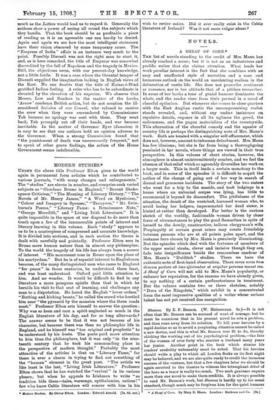MODERN STUDIES.*
UNDER the above title Professor Elton gives to the world again in permanent form articles which he contributed to various journals, "with many changes and enlargements." The " studies " are eleven in number, and comprise such varied subjects as "Giordano Bruno in England," "Recent Shake- speare Criticism," "The Meaning of Literary History," "The Novels of Mr. Henry James," "A Word on Mysticism," "Colour and Imagery in Spenser," "Tennyson," "Mr. Swin- burne's Poems," "Literary Fame : a Renaissance Note," "George Meredith," and "Living Irish Literature." It is quite impossible in the space at our disposal to do more than touch upon a few of the innumerable points of interest and literary learning in this volume. Each "study" appears to us to be a masterpiece of compressed and accurate knowledge. It is divided into sections, and in each section the theme is dealt with carefully and pointedly. Professor Elton sees in Bruno more human nature than in almost any philosopher. To the world the tragedy of his life has always been a source of interest. "His monument rose in Rome upon the place of his martyrdom." But he is of especial interest to Englishmen because, of the many distinguished men who came to England "for peace" in those centuries, he understood them least, and was least understood. Oxford paid little attention to him. And no wonder. It would be difficult to find in any literature a more pompous epistle than that in which he heralds his visit to that seat of learning, and challenges any man to a disputation. He hated the English "lower orders." "Butting and kicking beasts," he called the crowd who hustled him near "the pyramid by the mansion where the three roads meet." Professor Elton sets himself to answer the question : Why was so keen and rare a spirit neglected so much in the English literature of his day, and for so long afterwards? The answer seems to be that it was not because of his character, but because there was then no philosophic life in England, and he himself was "too original and prophetic" to be understood by his hosts. The poets paid more attention to him than the philosophers, but it was only "in the nine- teenth century that he took his commanding place in the perspective of modern thought." Probably the most attractive of the articles is that on "Literary Fame," for there is ever a charm in trying to find out something of the "human" element in the great poet. "The article we like least is the last, "Living Irish Literature." Professor Elton shows that he has watched the "revival" in its various phases; but when he appeals to Irishmen to write "as tradition bids them—tales, warsongs, epithalamies, satires!" few who know Celtic literature will concur with him in his • Modern Studies. By Oliver Elton. London: Edward Arnold. [Th. 6d. net.]
wish to revive satire. Did it ever really exist in the Celtio literature of Ireland ? Was it not mere vulgar abuse ?




































 Previous page
Previous page